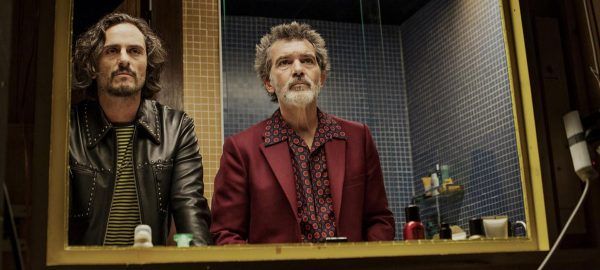Salvador Mallo (Antonio Banderas) is a director whose life has come to a standstill. He hasn’t made a movie in years due to both physical and emotional distress. Spinal surgery has left him in almost constant pain and the recent death of his mother still haunts him. He doesn’t know what he’s looking for, but he’s grasping for something as he spends his days alone in his Madrid home. When one of his classic films is restored he reaches out to the star of the picture, Alberto Crespo (Asier Etxeandia), to attend the Q&A with him. They have not spoken for almost 30 years, but their reunion sets off a chain of events that drives the nostalgic road of forgiveness which is at the heart of Pedro Almodóvar’sPain and Glory.
To be frank, Alberto is not thrilled to see Salvador. But with his acting career in something of a serious downturn he invites the director into his home anyway. The two men cannot help but push each other’s buttons for a good minute and then something serendipitous happens. Alberto pulls out some heroin and Salvador doesn’t flinch. He makes a spur of the moment decision he wouldn’t have dreamed of decades before. He takes a hit.
Knocked out, we revisit Salvador’s childhood where his mother, Jacinta (Penelope Cruz, flawless), is traveling with him across Spain to meet his father in their new home in Paterna, a town outside Valencia. Paterna is known for its cave like dwellings and Jacinta is initially horrified to discover that’s the only accommodations her husband could secure.
Eventually present-day Salvador wakes up and heads home. It’s too late for him, however. He’s got that heroin bug. It’s the only drug he’s taken which has effectively wiped out his physical pain. As he uses it in private, it becomes a mechanism to reflect on his relationship with Jacinta (including an older version portrayed by Julieta Serrano) and his first gay inklings thanks to a surprise shower show by Padre (César Vicente), a young housepainter he’s teaching how to read and write.
Salvador’s slow addiction also brings out the worst of him as he ends up skipping the Q&A. With Alberto immensely frustrated, Salvador realizes he needs to make it up to him. He decides to give him the rights to an essay he’d written on a whim and which Alberto sneakily discovered. Alberto can use it as a monologue for a one-man show but can’t credit him. The show, of course, is as much of a hit as an “off, off” production can be in any city, but it reveals another secret of Salvador’s past. The prose chronicles an almost 40-years-old love affair Salvador had with Federico (Leonardo Sbaraglia), a boyfriend who suffered from a massive heroin addiction. When Federico returns to Madrid on family business he catches the show and makes a surprise appearance on Salvador’s front door.
Debuting at the 2019 Cannes Film Festival after opening in Spain in March, Pain and Glory is clearly Almodóvar’s most personal work to date, even as the often-candid filmmaker has sometimes danced around whether how much circumstances in his previous works were based on real life. That’s undeniable here, however, as Almodóvar puts himself front and center as Salvador, making us wonder how melancholy he’s getting with 70 is right around the corner.
You could argue that Almodóvar hasn’t made an iconic film since his venture into psychological horror with 2011’s The Skin I Live In (also with Banderas in a lead role). Almodóvar would likely scoff at any suggestion his last two releases felt as though he was going through the motions but diving into his past has rekindled some of the spark from the height of his work around the turn of the century such as All About My Mother and Talk to Her.
Like a number of films at this year’s festival, Pain and Glory takes quite a long time to get going. The first half seems slightly arduous and you wonder where Almodóvar is going with all this. Around the halfway point things take a turn and Banderas opens up a side to Salvador we haven’t seen before. The Spanish-born actor has delivered some of his best performances working with Almodóvar – this is their eighth collaboration – and that’s absolutely the case here.
In the end though, it’s Almodóvar's story. And it’s his decision to disclose what he sees fit. Some questions are unanswered, some storylines unresolved. Choices perfectly capsulated in the film’s final, glorious shot. With an actor looking at the man behind the camera as a scene breaks down behind them. Reminding us that life is always and has been a melodrama.
Grade: B+
Catch up on all of our reviews from the 2019 Cannes Film Festival below:



